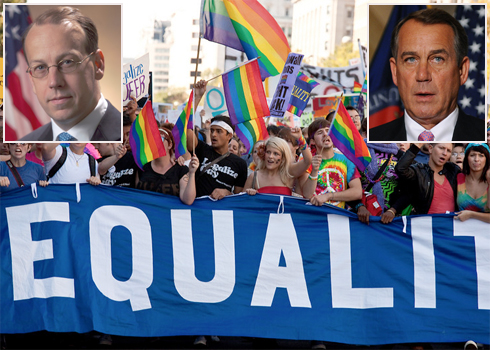When the Atlanta-based law firm King & Spalding announced on April 18 that it would represent the Republican-controlled House of Representatives and defend the constitutionality of the Defense of Marriage Act, it apparently didn’t realize what a mess it had made for itself.
Exactly one week later, the firm reversed its decision, prompting a high-profile partner — former Solicitor General Paul Clement — to resign publicly, and House Speaker John Boehner’s staff to issue a statement criticizing the firm for “its careless disregard for its responsibilities to the House in this constitutional matter.”
As public relations debacles go, this was a doozy. But the firm must have calculated that the alternative would have been worse. In the intervening week, a series of public and behind-the-scenes developments made it clear that the firm would suffer recriminations for defending what many of its top clients and future recruits — not to mention gay rights advocates — consider to be an anti-gay law.
Sources with knowledge of the backlash confirm that one of King & Spalding’s top clients, Coca Cola, also based in Atlanta, directly intervened to press the firm to extricate itself from the case.
A Coca Cola spokesman declined to comment on or off the record for this story, but pointed TPM to the company’s long public history of support for equality and diversity.
DOMA defines marriage as between a man and a woman and holds that states may not be compelled to recognize same-sex marriages performed in other states. The Obama Administration recently decided it could no longer defend the constitutionality of the law, and placed the onus on Boehner, who quickly accepted it.
Other King & Spalding clients likewise conveyed to the firm that its decision to take the DOMA case could cause them problems, both internally and with customers, according to sources who spoke with TPM. It also faced its own internal backlash.
But it wasn’t just private pressure. King & Spalding also faced escalating protests from gay rights groups. The LGBT community in Atlanta has significant political influence, and the firm quickly became a target for major gay rights organizations including the Human Rights Campaign and the group Georgia Equality — the largest gay rights advocate in the state. The groups planned an aggressive ad campaign, direct communication with the firm’s clients, and a diminution of its Corporate Equality Index ranking — the metric HRC uses to track corporate support for gay rights.
They had also scheduled a large public event for Tuesday, April 26, but quickly canceled it after King & Spalding announced Monday that it had withdrawn from the case, sparking Clement’s resignation from the firm. Clement, a leading light among top conservative lawyers in DC who served as solicitor general under George W. Bush, quickly landed at a boutique DC firm populated by other conservative lawyers, where he announced he would continue to handle the DOMA case for the House of Representatives.
Fred Sainz, vice president of communications for HRC, explained his group’s strategy in a phone interview with TPM.
“Law firms are probably most attentive to two issues: Their clients and potential new recruits. When you start messing with either of those from a reputational perspective, that’s when they stand up and take notice when there’s a problem,” Sainz said. “We were launching a very targeted campaign at both of those.”
According to Sainz, HRC “had already started contacting their clients. … [King & Spalding was] starting to hear from companies that this was causing those companies a great deal of consternation, and they might have to rethink their relationships [with the firm].”
Complicating matters for King & Spalding, the firm’s contract with the House of Representatives contained a curious provision that seemingly barred firm employees — even those not involved with the case — from advocating for gay equality in their private capacities outside the firm, so long as the firm was defending DOMA. Employees, the contract stated, “will not engage in lobbying or advocacy for or
against any legislation [to] alter or amend in any way the Defense of Marriage Act.”
According to the National Law Journal, “Gay-rights lawyers interpret that to be a gag order for firm employees.”
That includes one employee, Atlanta associate Brian Basinger, who is president of the Stonewall Bar Association of Georgia, a group that pushes for gay rights.
“It does appear to me to be a bit draconian, in that it could be interpreted to limit employees of the law firm from doing LGBT work in their private time,” said Jeffery Cleghorn, the immediate past president of the Stonewall Bar Association and a name partner at Atlanta’s Kitchens New Cleghorn.
Other high-powered law firms in New York and Washington, D.C., wanted nothing to do with the case from the outset. King & Spalding will still pay some price for its original misstep — and they’ll definitely have to swat away gnats in the conservative movement. But it’s likely a smaller price than they would have paid if they hadn’t cut bait so quickly.
Clement will now take up the case as a partner for Bancroft, LLP — “a boutique firm made up of former Bush administration lawyers,” as one LGBT advocate familiar with the pressure put on King & Spalding described it. It will thus be largely immune from public blowback. The switch is in and of itself a victory for DOMA foes, according to Jon Davidson, legal director for the gay rights group Lambda Legal. “It’s a small firm,” he said. “It looks from their website that [Clement] will be the seventh partner with two associates? They’re going to have their hands full.”
Additional reporting by Evan McMorris-Santoro.






